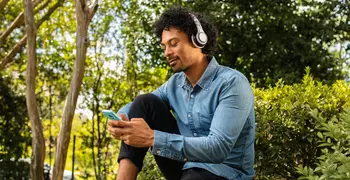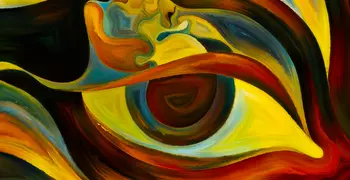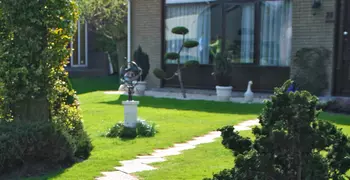Coping With Covid-19 Uncertainty

Nina was in Pittsburgh visiting a friend at her college when the news hit. The pivotal moment was when her friend got an email saying that she had to move out of her dorm. Nina describes it this way: “We went through feelings of anger, frustration, and confusion together. It felt very surreal. Within a few days, though, I kind of released that anger and realized that this is so much bigger than me. The negative feelings got replaced with a kind of shock. I know everything’s gonna be okay, but I feel very in limbo. I just feel a general anxiety about what next semester is gonna be like, there’s a lot of question marks floating around right now.”
You might recognize some of these emotions and, like Nina, feel in a state of limbo right now. We are living in uncertain times. But there are things we can do.
 Dealing with fear and anxiety
Dealing with fear and anxiety
Many of us are experiencing fear and anxiety around how we will finish our semester, our summer or future job prospects, our finances, and of course the health of those around us. Here are some techniques that might help.
Name it to tame it. Research has shown that the simple act of labeling an emotion can decrease its intensity in the emotional centers of your brain. Naming these emotions (fear, uncertainty, anxiety) can help separate the passing experience of emotions from the self, so you don’t have to identify with those temporary states of being.
When you do encounter a negative emotion, notice it. Most people do not like being uncomfortable. However, negative emotional experiences show you important information about yourself. There are few things that connect you deeper to yourself than emotions such as fear, anger, and grief, if only you can stop in them and listen.
Face your mortality. If there is one thing that COVID-19 has taught humanity, it is that we are vulnerable to things outside of us. Right now, we might be feeling a sense of uneasiness and fear for ourselves and our loved ones.
Nina
I feel like young people think that they're invincible, with the way they’re acting like “Oh, I won’t get that sick,” “I won’t have symptoms,” or, “It just won’t be that bad because I’m young,” when that’s not necessarily true. Even if you make a full recovery, it doesn’t mean it’s not terrible and painful to have. I remember times when I’ve been so sick I’ve wanted to die; that is not fun to experience at all. It’s really making me think about how delicate health is and how vulnerable we are.
Saren
It’s interesting to think that older people and people with immunodeficiencies are at risk. I’m not even really questioning whether I’ll die, amidst all this lockdown stuff I just realized that this isn’t even for me. This is for other people. And it’s that aspect that is giving me the drive to respect the lockdown and stay at home—just knowing that I might recover from coronavirus, but other people might not be as fortunate.
Deanna
We recently found out that we know someone who is in critical condition in New York, and she’s only 30, which is pretty scary.
This is awakening us to what it means to be alive. We are always facing death; some of us sooner than others, but the destination is the same for all. And that makes it important for us to consider how we want to live, what we want to do to contribute in the time we have. It may be the time for those of us with a spiritual or religious tradition to lean into those teachings.
 Dealing with isolation/making connections
Dealing with isolation/making connections
As university students, our daily lives are normally full of other people—our classmates, our roommates, our team or band or club connections, our friends. So staying at home and socially distancing can be particularly difficult. We sympathize!
Try reframing social distancing. “Social distancing” is a term applied by public health officials to describe group behaviors that can slow the spread of a virus. However, the term is not entirely accurate and may be creating a negative impact! The term “social distancing” implies that you won’t get your social needs met or that you are cut from your community, which can activate the amygdala, or fear center, in your brain. Try relabeling this behavior as spatial distancing, which is a better way to understand it.
People are being called to stay at least six feet away from other people to reduce the likelihood of transmission. Thankfully, we live in a time when we can still be social even when we are miles (or even continents) apart! The world is incredibly connected now, and simply calling a friend is an act of social closeness. Speak with intention about the situation and encourage those around you to do the same.
Explore isolation and options. You’re afraid of sitting in your house all day? Of being still with yourself? Take a pause. A reality check may be in order here. Consider how difficult it is to go to school or work everyday. Or to form healthy relationships. Or to put food on the table and care for loved ones. Sitting in your own silence may be hard simply because you’ve never done it. Can you be curious about this experience rather than just resisting it? Can you find new ways to be and new things to do? What will you choose to take from this experience?
Nina
I’ve been making lists of things I’m really looking forward to doing once it’s okay to leave the house and see people again.
My list includes going to the Mall of America, seeing new releases at the movie theatre, going out with friends to nice restaurants... other things that I just hadn’t been making time for before. It’s funny, as soon as I found I didn’t have that choice to do those things, they felt more important.
I’ve also been logging what I’m reading on GoodReads and logging what I watch with reviews on Letterbox. This makes me feel like I’m putting something out there in the world, it makes me feel productive, and it’s fun to just keep track of the things I’m watching and my reactions to them. I’ve also been doing a lot of creative writing. So I guess I’ve been taking this time to be productive artistically. Everything might be kind of in disarray, but hey, at least I’m writing! I definitely feel like I’m flowing when I’m writing. I wrote for like three hours yesterday; I stayed up super late into the night but it only felt like half an hour went by. It’s such a wonderful feeling. I’m definitely finding a silver lining to all this.
Saren
Some people need to be by themselves to recharge at the end of the day, but me, I like to be around people. That’s been my biggest struggle, to adjust to that change.
Now, I’m finding that I have a lot of free time. Recently I’ve been trying to improve my skills in guitar, violin, and music production. I really like to create things so I can look at something and be like “hey, I made this.” So when I have free time, I’ll make things: a video, a song, stuff like that. I’m also writing a poem a day, depending on how I feel. It’s a new thing that I hope to continue doing, even once this COVID-19 stuff blows over.
Creating healthy habits in a new world
As we adjust to new ways of learning, working, and living, we may find that many of our former behaviors no longer serve us. Change begets change; this is a great opportunity to introduce healthier habits into your days.
- Be mindful of the news you consume. It’s important to get the information that you need from trusted sources, but do it with intention. Once you get the updates that are important to you, anything more is excess. Curate what you allow into your life. Now is the chance to set limits for the sake of your mental health.
- Realize the power of habits. Your life right now is mostly the sum of your habits. Take this time to create daily habits that increase your wellbeing. Consider a gratitude journal, a meditation practice, or even just turning your phone off an hour before going to bed. Start small, and know that enduring habits are the result of many small acts of willpower performed over time.
- Try sobriety. If you’ve been noticing a growing reliance on alcohol or drugs, consider using this time as a break. Can you truly be alone in your head? Can you suffer without trying to run from it? Nationwide, liquor stores are seeing a large increase in sales. It may be tempting to reach for something to take the edge off, which is exactly why that urge is worth reconsidering. By no means do you have to go cold-turkey. Be gentle with yourself as you try to create a habit of consuming less, and celebrate your successes with an accountability partner.
Recovery on Campus hosts virtual meetings for students in recovery from drug and alcohol use and friends who are allies. Here is a link to their Facebook page for meeting dates and times.
Seeing the bright side
In all of this, students are also taking a positive view: seeing our Minnesota community help each other and getting a new perspective.
Deanna
I’m very proud of how Minnesota and specifically my community has handled dealing with coronavirus. I feel like, right away, our leaders took it very seriously and took a lot of proactive steps to reduce the spread, and I think the University did a great job of protecting its students. I’m very proud to be part of this community. I think Minnesota is doing better than most states at containing the spread and it’s good to know that others are taking it seriously.
It’s a big change but I think we are getting used to it. It’s just another thing that we are gonna deal with together.
Nina
I think this whole situation is just reminding us of the things we take for granted, so I’m really looking forward to being able to enjoy things again, and just enjoy them for what they are.
Saren
Even someone like myself, who hates this quarantine and would do anything to go back to a regular schedule… I’ve looked at statistics on how effective social distancing is, and I realized that it’s really a small price to pay for the life of someone else. So, that’s been helping me cope: realizing that people’s lives are at stake.
A final word
It’s perfectly normal to be stressed, anxious, or upset during a pandemic. You may also be curious, motivated, or excited for the changes that this will bring. Whatever mix of emotions you’re feeling, know that it’s never a bad time to ask for help.
If you are experiencing a mental health crisis, call the UMN Crisis Line at 612-301-4673. You can also text “UMN” to 61222, available 24 hours.
Learn more about Student Wellbeing. Student Wellbeing provides resources specific to college students and their wellbeing, especially around issues like stress, mental health, addiction, financial obstacles, and other barriers that prevent them from thriving at university and in life.
Torre, J. B., & Lieberman, M. D. (2018). Putting Feelings Into Words: Affect Labeling as Implicit Emotion Regulation. Emotion Review, 10(2), 116–124. https://doi.org/10.1177/1754073917742706


